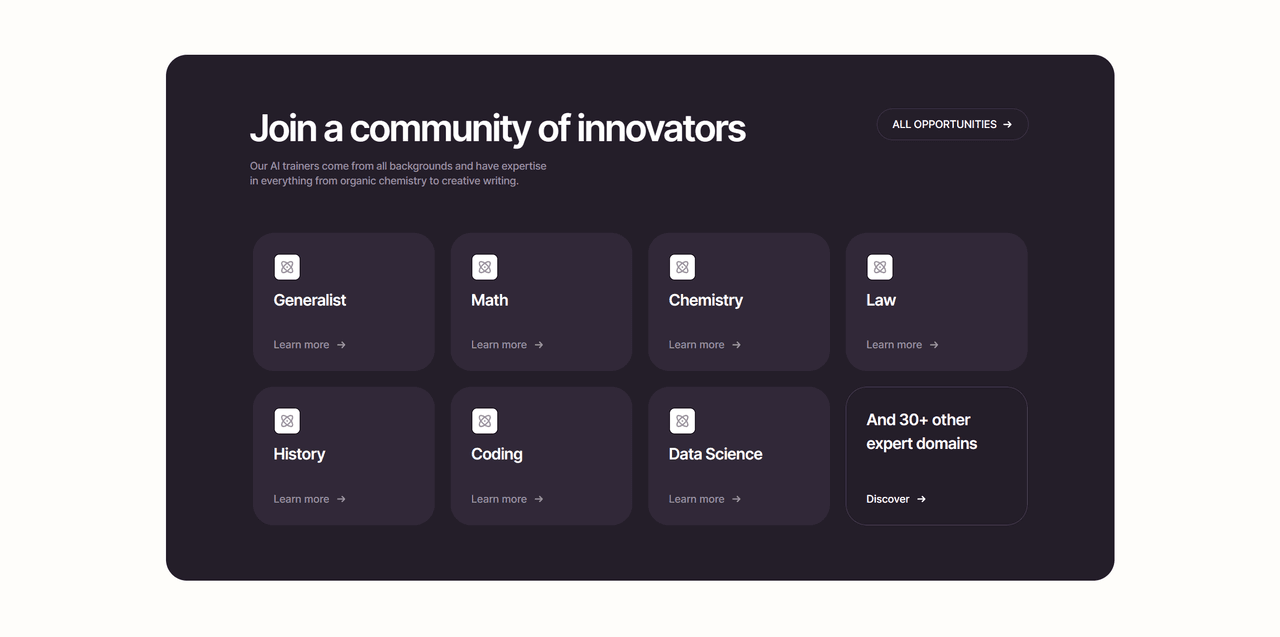Imagine being able to use your unique background and skills to shape the future of artificial intelligence while working from anywhere in the world. This dream can become a reality for many experts across diverse fields, from chemistry to creative writing, through opportunities in AI training. Let's dive into how you can turn your knowledge into impactful contributions and personal income.
What is AI Training?
AI training is a crucial process that involves curating, refining, and evaluating data to enhance machine-learning models. It’s not just about feeding data into a system; it’s about shaping that data to ensure the AI understands and learns effectively. The importance of AI training cannot be overstated. It lays the foundation for creating AI that is reliable, safe, and beneficial for society.
How Experts Contribute
Experts play a vital role in AI training. They come from diverse fields, bringing unique perspectives and knowledge. For example, a psychologist might help train AI to understand human emotions better, while a chemist could assist in developing AI for scientific research. Their contributions make AI technologies not only smarter but also safer.
Data Curators: They select and organize the data used for training.
Evaluators: They assess the AI's performance and suggest improvements.
Subject Matter Experts: They provide insights relevant to their fields to enhance AI understanding.
By collaborating across various disciplines, these experts ensure that AI systems are robust and reliable. This is essential for applications ranging from healthcare to autonomous vehicles.
Benefits of Getting Involved in AI Training
Getting involved in AI training offers numerous benefits:
Financial Rewards: Contributors have earned over $100 million collectively.
Flexibility: Experts can work from anywhere and choose their hours.
Continuous Learning: Every task presents an opportunity to learn something new.
Imagine being part of a community where your expertise helps shape the future of technology. That's what AI training offers. As Martin M. aptly puts it,
“AI training is an exciting field where knowledge meets innovation.”
Engagement and Community
AI training is not just a job; it’s a collaborative effort. With 40,000 experts involved and 3.4 million assignments completed, the community is thriving. This environment fosters creativity and innovation, allowing contributors to engage with like-minded individuals. It’s a unique blend of work and passion, where every contribution counts.
In summary, AI training is a dynamic and essential field. It brings together diverse experts to create AI that is not only intelligent but also safe and reliable. Those who participate in this process not only contribute to technological advancement but also gain valuable experiences and rewards.

Why Work as an AI Trainer?
In today's fast-paced world, the role of an AI trainer is becoming increasingly appealing. Imagine a job that offers you the chance to work from anywhere, at any time. Sounds enticing, right? This flexibility is one of the most significant advantages of being an AI trainer.
1. Flexibility to Work Remotely
AI trainers have the freedom to work from any location. Whether it's a cozy café or the comfort of your home, the choice is yours. This flexibility allows trainers to manage their time effectively. They can fit their work around other commitments, such as family or education. The ability to choose your workspace can lead to a more balanced lifestyle.
"The flexibility is absolutely amazing; it was a blessing to have this freedom for the first time." - Casey R.
2. Competitive Compensation
Another compelling reason to consider this career is the competitive compensation. Many experts report high satisfaction with their earnings. It's not uncommon for trainers to earn around $2,000 after just one month of working on projects. This income can be quite lucrative, especially when considering the flexibility that comes with it.
3. Opportunity to Learn
Working as an AI trainer means diving into a wide variety of subjects. Each project presents an opportunity to learn something new. For instance, one trainer recently discovered fascinating Swiss recipes while working on a task. This constant learning keeps the work engaging and fresh. Who wouldn't want a job where they can expand their knowledge daily?
4. Build a Supportive Network
AI training roles also provide the chance to connect with like-minded individuals. Trainers often build a supportive network of fellow experts. This community can be invaluable. It offers not just collaboration, but also a space to share experiences and resources. In a field that is always evolving, having a solid support system is crucial.
Final Thoughts
In summary, the role of an AI trainer combines flexibility, competitive pay, continuous learning, and community building. It’s a unique opportunity to contribute to cutting-edge technology while enjoying a fulfilling career. Whether you're looking to switch careers or just starting out, this path offers exciting possibilities.
Unique Experiences from Current AI Trainers
In the ever-evolving world of artificial intelligence, trainers play a crucial role. They bring their expertise, creativity, and passion to the table. This blend of skills leads to unique experiences and insights. Let's dive into what current AI trainers are saying about their journeys.
Personal Anecdotes from Various Experts
Every trainer has a story. For instance, Martin M., a history expert, shares his excitement about the freedom he enjoys in this role. He mentions,
“The flexibility is absolutely amazing and I really enjoy it. It was a blessing having this kind of freedom for the first time.”
This freedom allows trainers to explore their interests while contributing to AI development.
Gabriela S., who specializes in psychology and education, highlights the creative aspect of training AI. She states,
“As an educator, you have to take an individual approach with each student. Training AI is engaging for me because I'm using that same creativity.”
This connection between teaching and AI training shows how diverse backgrounds enrich the training process.
Insights on the Projects They Work On
The variety of projects is another thrilling aspect of AI training. Daliah B., a German language expert, captures this perfectly:
“Every time you see a task, you learn something new, it's never boring.”
She recently discovered Swiss recipes while working on a project. This illustrates how AI training can be both educational and enjoyable.
Trainers often work on tasks that require them to evaluate and refine AI models. This means they learn about different cultures, languages, and even cooking techniques. The opportunities to explore new topics are endless.
How AI Training Can Complement Existing Careers
AI training isn't just for tech experts. Many trainers find that their existing careers align beautifully with this work. For example, Hamed H. mentions, “I can work anytime from anywhere. After only one month, I made around $2,000 from working on projects.” This flexibility allows professionals to supplement their income while pursuing their passions.
Moreover, Scott O. emphasizes the community aspect. He notes, “I've worked on other platforms, but there is absolutely no support available. At Outlier, you're really getting into an online community.” This sense of belonging can be a significant motivator for trainers.
The Excitement of Learning Through Diverse Projects
Learning is a continuous journey for AI trainers. Each project brings new challenges and insights. Casey R., another generalist, highlights the balance he achieves between family and work. He says, “Working remotely has given me the ability to strike the perfect balance between nurturing my family and pursuing professional goals.”
In conclusion, the experiences shared by current AI trainers reveal a world of excitement, learning, and community. They illustrate the versatility and fulfillment that come with this unique role. With each task, trainers not only contribute to AI but also enrich their own lives in the process.
The Onboarding Process for AI Trainers
Starting a new journey can be both exciting and daunting. The onboarding process for AI trainers is designed to ease this transition. It helps candidates understand what to expect and equips them with the skills needed to succeed. So, what does this process look like?
Steps to Apply and Qualify as an AI Trainer
First, candidates must apply. This involves submitting a resume that highlights their expertise. Depending on the domain, candidates may also need to pass a screening exam. Some may even face a virtual interview. It’s a thorough process, but it ensures that only qualified individuals join the team.
Overview of Onboarding Training Modules
Once selected, candidates undergo tailored onboarding training. This training consists of several modules designed to prepare them for their specific roles. Each module is focused on providing the necessary knowledge and skills. It’s a great way to get familiar with the tasks at hand. As Gabriela S. said,
"The onboarding prepared me to contribute effectively to AI projects!"
Potential for Payment During Onboarding
One of the most attractive aspects of this onboarding process is the potential for payment. Candidates are compensated for their time spent completing the onboarding modules. This makes the transition smoother, as they are not only gaining knowledge but also earning money. Who wouldn’t want to get paid while learning?
Time Expectations and Project Opportunities Post-Onboarding
Time is a valuable resource. Candidates can expect to spend between 1 to 5 hours completing the onboarding process. This varies depending on the specific requirements of their domain. Once onboarding is complete, they can dive into various project opportunities. Flexibility is key here; contributors can choose their hours based on their availability.
Onboarding Completion Time | Domain Requirements |
|---|---|
1-5 hours estimated | Various onboarding requirements depending on the domain |
Overall, the onboarding process is structured to set clear expectations for new applicants. It aims to clarify the process and timeline for new hires. With a supportive environment and comprehensive training, candidates are well-prepared to contribute to the exciting world of AI.
FAQs and Considerations for Aspiring AI Trainers
Becoming an AI trainer can be an exciting journey. Yet, many potential trainers have questions about the role. What does it involve? How do compensation models work? Can you achieve a good work-life balance? Let's dive into some of the most common inquiries.
1. Roles and Responsibilities in AI Training
What does an AI trainer actually do? At its core, the role involves training AI models to understand and generate human-like responses. This can include:
Creating training data that helps AI learn.
Evaluating AI performance to ensure accuracy.
Collaborating with other experts in various domains.
Every task is different. Some trainers focus on specific subjects, while others may work across multiple fields. This variety keeps the work engaging and fresh.
2. Compensation Models and Payment Expectations
Let's talk money. Many aspiring trainers wonder how they will be compensated. Generally, payment varies based on factors like:
Your area of expertise.
The complexity of the tasks.
Your experience level.
Most trainers are paid weekly, and some domains may even offer additional rewards for superior performance. It's a flexible model that allows trainers to earn based on their contributions. As Scott O. said,
"Everyone is an expert at something; share your knowledge to help shape AI!"
3. Opportunities for Advancement and Skill Development
Is there room to grow? Absolutely! AI training provides numerous opportunities for advancement. Trainers can:
Enhance their skills through various projects.
Network with other professionals in the field.
Gain experience that can lead to higher-paying roles in AI and tech.
Continuous learning is a key part of this journey. The more you engage, the more you will grow.
4. Work-Life Balance as an AI Trainer
How does the role affect personal life? One of the most appealing aspects of being an AI trainer is flexibility. Trainers can work from anywhere and choose their hours. This adaptability allows individuals to balance their professional and personal lives effectively.
Many trainers have shared their experiences, highlighting how this role has allowed them to nurture their families while pursuing their professional goals. They can work as little as 5-10 hours a week or up to 40 hours, depending on their availability.
In conclusion, aspiring AI trainers often have many questions about their future roles. From understanding responsibilities to exploring compensation and work-life balance, clarity is crucial. The world of AI training is not just about technology; it's about people. With the right mindset and dedication, anyone can contribute to shaping the next generation of AI.




